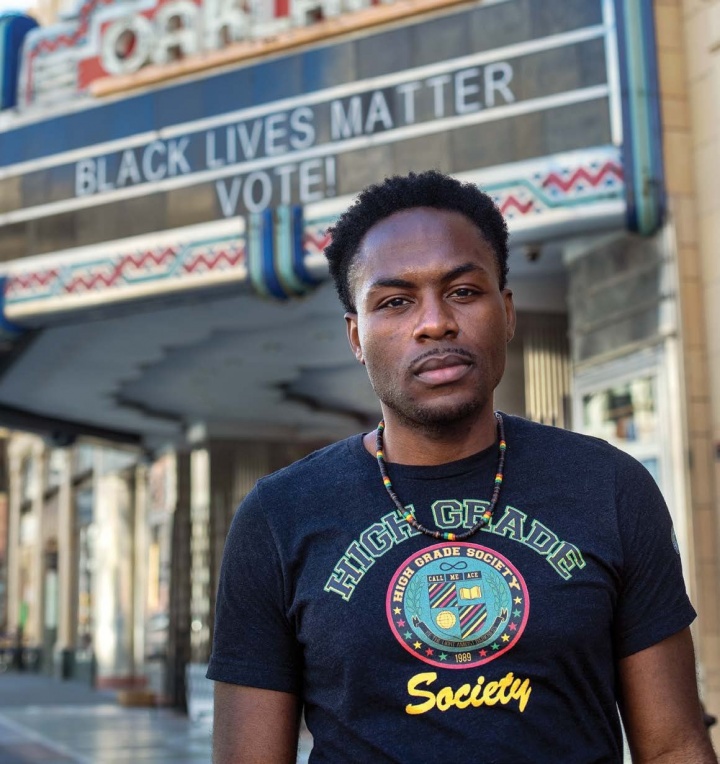Columbia College | Columbia University in the City of New York
Anthony “Ace” Patterson ’11 Makes Music on His Own Terms

RENÉE LOPEZ
In late June, the nationwide protests in support of the Black Lives Matter movement inspired Patterson to release Working From Home Extended — five songs that explore themes of survival amidst a global pandemic, racial injustice and social unrest. He donated the proceeds from pre-sales to Faith in Action’s Live Free campaign, which works to prevent gun violence and mass incarceration.
Patterson began writing lyrics when he was a middle-school student in Bridgeport, Conn., where, at one point in his childhood, he lived in a shelter. In 2016, he founded his own music label, Light Armor Music. Three years later, under the alias Call Me Ace, he released his first album, Airplane Mode. It debuted at number 3 on the iTunes Top 40 US Hip-Hop Album Chart and at number 50 on the Billboard Top R&B/Hip-Hop Album Sales Chart.
Patterson describes his music as “uplifting,” while pointing out that “it’s definitely not bubblegum; it’s real-life stuff.
“I understand what it means to come from nothing and have to overcome adversity,” he adds. “It’s a consistent theme in my music.” Patterson attributes his love of music to his mother, a Jamaican immigrant who would have him and his siblings perform songs by Boyz II Men, Whitney Houston and Michael Jackson. He cites hip-hop legends Snoop Dogg, DMX, Busta Rhymes, Ludacris and Young Jeezy among his musical influences.
“There’s a lot regarding cadence, rhyme schemes, confidence and authentic storytelling that I took away from them,” says Patterson. As a College senior, Patterson opened for Snoop Dog at Bacchanal’s Spring Concert. The Columbia University Society of Hip- Hop, which Patterson co-founded in 2009 with Mpho Brown ’12 and Jon Tanners ’11, beat seven other musical acts to land the coveted gig.
“I never felt like I couldn’t perform in front of 26,000 people, but knowing that I did, it’s like, ‘Cool, I know I can do that,’” says Patterson. By the time he took the stage on Low Plaza, however, Patterson was at a crossroads. He found himself at odds with the themes of hip-hop, which he notes often include drug use and chasing money and women. “I didn’t want to rap anymore,” Patterson says. “I didn’t necessarily like or connect to the things I was rapping about.”
After graduation, Patterson quit music for about four years. He was pursuing an M.B.A. at UC Berkeley’s Haas School of Business when a childhood friend convinced him to pick up a microphone again. In his final semester, he and a classmate recorded a parody song dedicated to the school, titled “YOHO (You Only Haas Once),” that was well received by his fellow students.
“That’s what made me say, ‘Oh wow, maybe there is a unique lane for me in the music business,’” says Patterson.
Patterson lives with his wife in the San Francisco Bay Area, where he previously worked at Facebook and is now a global program manager with YouTube’s creative and development team. In that role, he designs and oversees initiatives that help creators and artists scale and monetize their work. All the while, he’s constantly looking to use the knowledge he’s gained in the corporate world to broaden his own audience.
“The way I see it, I’m just getting started,” he says.
Nathalie Alonso ’08, from Queens, is a freelance writer and an editorial producer for LasMayores.com, Major League Baseball’s official Spanish-language website.
Issue Contents
Published three times a year by Columbia College for alumni, students, faculty, parents and friends.
Columbia Alumni Center
622 W. 113th St., MC 4530, 6th Fl.
New York, NY 10025
212-851-7852
cct@columbia.edu
Columbia Alumni Center
622 W. 113th St., MC 4530, 4th Fl.
New York, NY 10025
212-851-7488
ccalumni@columbia.edu

